Lori Goodson, Editor
Mary Hammel, Technical Editor
Category: April 2017
Happenings in Bluemont Hall
OK, admit it! You know you miss this old building! Well, we hope you miss the faculty as well, so we’re giving you a glimpse of what’s been going on in BH. First are some photos of the Curriculum and Instruction Department’s Big Picture Day, held March 17 (St. Patrick’s Day, which explains all the green!), followed by some Open House photos from April 1 in BH. (Next issue, we’ll share some pics from Dr. Burenheide’s History “Wax” Museum at Open House.)
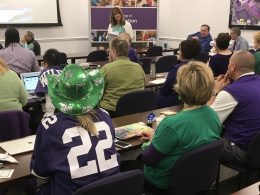
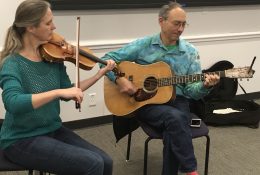
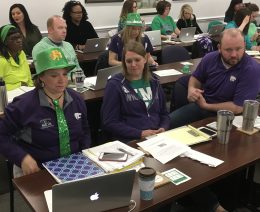
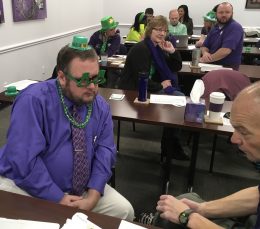


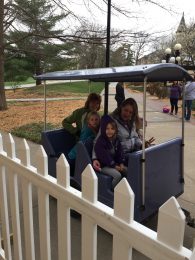

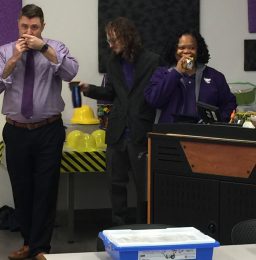
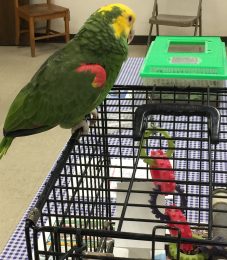
In the Classroom: Kate Gronquist

Name: Kate Gronquist
School district: Ulysses High School, USD 214
City/State: Ulysses, KS
Class/content area taught: Family and Consumer Sciences (Culinary Essentials, Baking and Pastry, Nutrition and Wellness, Human Development, and Family Studies). She also is the FCCLA sponsor and cheer coach.
Kate Gronquist, wrapping up her second semester of teaching, says she especially enjoys “watching kids apply projects to their life. They get really into whatever activities we are working on. For example, we were talking about stress in my nutrition class. I had a student come tell me they used stress management techniques I taught them when they were stressing out about a test. Or in my Culinary class we talked about soy and sampled soy milk. One student enjoyed it so much he had his mom go buy him some soy milk that night!”
Most of Kate’s classes are semester long electives, which means she starts with a new group for second semester.
“Second semester has been a great experience for me…. At the beginning of this semester I got to start fresh with new classes. I was able to learn from my mistakes I made last semester and make changes. All of my classroom routines and policies are running much more smoothly this semester. I’m no longer creating every single lesson plan from scratch!!! I have also been at my school long enough to have it feel more like home. I have built up relationships with students and teachers. I understand more small things about the school that may seem insignificant, but really they help (i.e. where are the paper clips?!?!)”

Among her accomplishments, she has received three grants totaling nearly $1,400 and was accepted into the American Association of Family and Consumer Sciences leadership academy for this summer.
She credits the KSU College of Education with preparing her well for her new career.
“The two specific things I believe helped me the most (besides my wonderful advisor, Sally Yahnke) have to do with field experiences. I believe putting students in the classroom their sophomore and junior year really helps you to feel comfortable being a leader in the classroom. Nothing can replace that face-to-face time with students, and I think it puts KSU students at a definite advantage. I also believe that rotating each field experience between different types of schools benefits students. I was in Manhattan Campus East, Junction City FSA, and Wamego High School [for field experiences]. Being able to experience multiple types of schools helped prepare me to teach in any type of school I desired. It also helped me figure out whether I like or dislike certain size schools, demographics, and areas. Some of my placements put me outside my comfort zone, but that definitely helped me in the long run.”
As a new teacher, Kate said, she is finding that breaking the school year into quarters helps it seem less overwhelming.
“During student teaching, which was simultaneously an awesome and awful experience, my classmates and I would tell ourselves that we could do anything for “x” amount of weeks,” she said. “It’s the same concept when you get your first job. At times it will be overwhelming and you may think, ‘Why in the world did I do this?!’, but it will get better.
“Survive your first quarter, then your first semester. Before you know it, it’ll be the beginning of your second year teaching. It flys by. Just try your best, and it will work out.”
Don’t Miss This Groovy Opportunity
Calling ALL EdCats! Save the date for a FREE opportunity to gather with other early-career teachers June 7! We’re bringin’ it back to Bluemont for a day of idea sharing for your classrooms!
Genius Hour, Coding, Service Learning in Classrooms, Flexible Seating, Mystery Skypes, and MORE!
Each attendee will get some fun classroom supplies for next year! SAVE.THE.DATE! Look for the link to reserve your space in next month’s Before the Bell Newsletter, as well as EdCat Social Media!
Questions? Contact Dr. Martinez at tonnie@ksu.edu
A Final To-Do List
 While the school calendar may be slipping away, you still have plenty to accomplish in your first year of teaching. Consider these points before you make your summer plans!
While the school calendar may be slipping away, you still have plenty to accomplish in your first year of teaching. Consider these points before you make your summer plans!
- Look at your yearlong curriculum map. How much content do you still need to cover? Are you behind schedule? If so, revise your April and May lesson plans and calendars, making sure you address all of the critical content you need to cover. Prioritize! And, if you need help determining what must be covered, visit with your mentor or a colleague or administrator to get their input.
- Review your gradebook. Are there any issues? Missing assignments? Do any of your students need a little more time with you (after school, at lunch, before school) to address some academic areas of concern? You still have a few weeks left in the school year to help them succeed.
- In the last few weeks, do you have any “wish we had time” assignments? Something that you’d love to work into the schedule? Is there a way to fit them in?
- Are there items or projects or papers that need to be sent home? Use these last few weeks of the school year to review and reorganize! You may need to create folders or envelops for each student to organize materials that need to go home.
- Spend a few minutes composing some brief notes to each student’s family, addressing some of the major accomplishments their children have made through the year. It’s great to remind parents and guardians of the steps their children have taken, but it’s also good for YOU to remember those as your year comes to an end. Try to make one more personal contact with each child’s family before the end of the school year. We have a tendency to focus on the issues a student may have in class, but we need to celebrate the positives. Share, share, share!
- Create an end-of-the-year to-do list for you AND your students. It might be something as simple (and extremely meaningful) as sending a note home or it might be following up on overdue library books or money for their lunch accounts.
Keep Your Eyes on the Finish Line
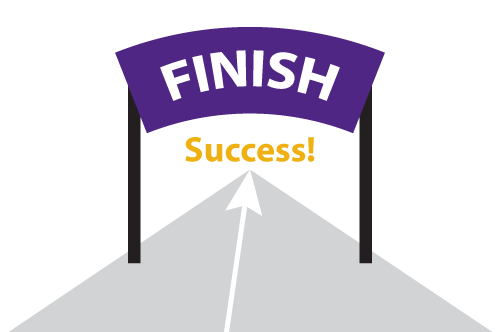 With just a little less than two months left in the school year, many of you are about to lose the title of Rookie Teacher. However, don’t overlook those last six to eight weeks. You still need to have a strong finish!
With just a little less than two months left in the school year, many of you are about to lose the title of Rookie Teacher. However, don’t overlook those last six to eight weeks. You still need to have a strong finish!
Use weekends to recharge as you set your sights on the end of the school year. Consider these ideas to help you end your year on a high note…and make your administrator thrilled to have you return for your second year:
- Now that you’ve been through several months, review your lesson plans. Make any alterations you believe are necessary to ensure the success of you and your students.
- Check with colleagues or administrators to make sure you’re aware of any end-of-year requirements—paperwork you need to have completed, special dates to put on your calendar, etc. It’s one more opportunity to make sure you’re not overlooking anything important.
- Take a deep breath and promise to enjoy your students. They’ve been your students for about eight months. Take a few seconds each day to simply look around the room and appreciate them.
- Remind yourself of at least one moment of progress or success each student has experienced.
- Take another deep breath and promise yourself to focus on the ups more than the downs of your first year of teaching. With a few weeks left, you still have time to make changes, mend fences, and make the most of their time with you!
Have You Emailed Us Yet?
![]() Do you have a question about classroom procedures? Or a suggestion for a topic we should address in Before the Bell? Want to add your name to our mailing list? Or provide a different email for our mailing list? Or, if you’re in your first year of teaching, send us a photo of you at work in your classroom!
Do you have a question about classroom procedures? Or a suggestion for a topic we should address in Before the Bell? Want to add your name to our mailing list? Or provide a different email for our mailing list? Or, if you’re in your first year of teaching, send us a photo of you at work in your classroom!
Early-career teachers, feel free to jump in and offer suggestions to those who are following your career choice!
We’d love to hear from you, so please email us at lagoodson@k-state.edu.
Go, COE Cats!
#WeAreEdCats…Check it Out
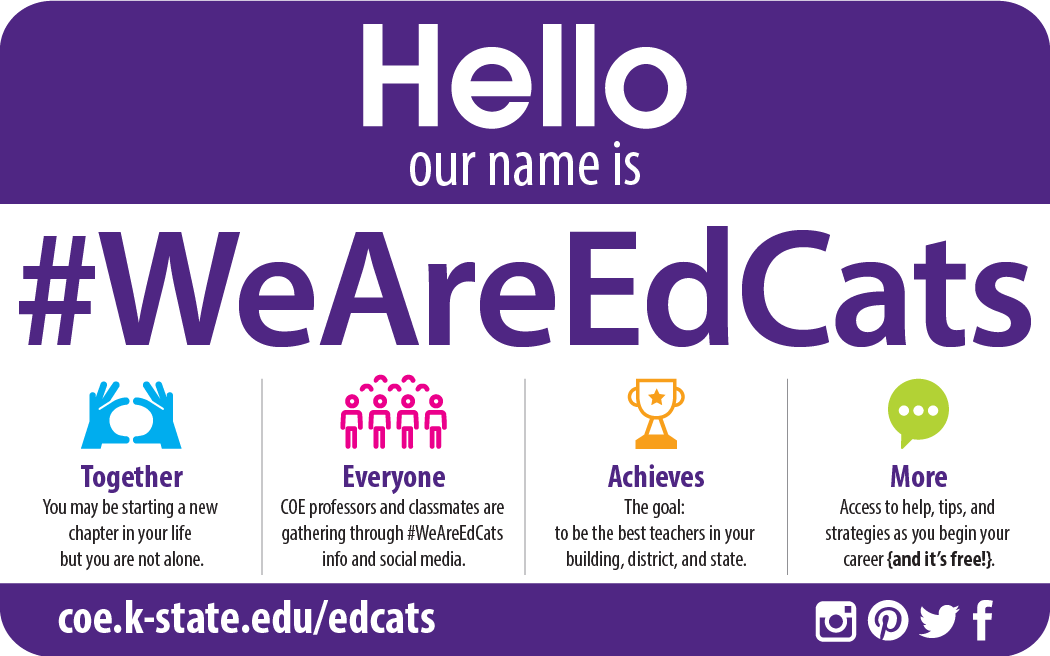 Have you checked this out yet? Join the fun today!
Have you checked this out yet? Join the fun today!
Dr. Tonnie Martinez and others are leading an effort to help beginning teachers like you thrive as you start your career! Check out #WeAreEdCats for teaching tips and to stay in touch with the COE! Check out the website at coe.k-state.edu/edcats.
Just How Cool is Your Content?
 We asked a few of your favorite professors why their specific content is so important in schools today. Here are some of their responses:
We asked a few of your favorite professors why their specific content is so important in schools today. Here are some of their responses:
Dr. Brad Burenheide (Secondary Social Studies)—“It is the backbone of the mission of schools and the core subject matter of education for the past 2500 years in the western world.”
Mrs. Kaylee Myers (Elementary Literacy)—“At a young age my kindergartners and second graders were so excited to be in school. I loved molding them into independent thinkers who believed they could try anything and it would be okay. That learning and reading were fun!”
Dr. Sally Yahnke (FACS)—“Family and Consumer Sciences is important because it teaches Life Skills that can help students be successful in whatever career they choose. The skills learned in FCS prepares student for work life and home life. They learn to be parents, purchase and prepare nutritious meals, consumer skills, money and time management, communicating with others, decision making in real life scenarios, problem solving.”
Dr. Sherri Martinie (Secondary Math)—“Math is applied in science courses, business course and the real world. Math is important to making sense of the world around us.”
Dr. Vicki Sherbert (Secondary English/Language Arts, Speech/Theatre, Journalism)—“Reading and writing are essential in order for our students to function as literate members of our society. They need to possess literacy skills in order to gain knowledge in other subject areas and to express their learning and understanding.”
Ms. Cyndi Kuhn (Technology)—“Technology is expected to be used at all grade level and in all content areas; embrace it!!”
Dr. Phillip Payne (Music Education)—“Music provides insight into one’s self more profoundly than any other subject. Music allows for self expression and also connects us to our school, our community, and our state (among others). Providing students with the cognitive keys necessary to access who they are as a person is one of the most influential acts we can do as music educators.”
In Our Next Issue…

You’re about to wind up your first year of teaching! Congratulations! Be sure to read next month’s newsletter for:
- Some of your favorite professors share their first-year teaching memories.
- Saying goodbye to your first class…it might be harder than you think!
- Keep an eye on August. We’ll offer some summer suggestions.
